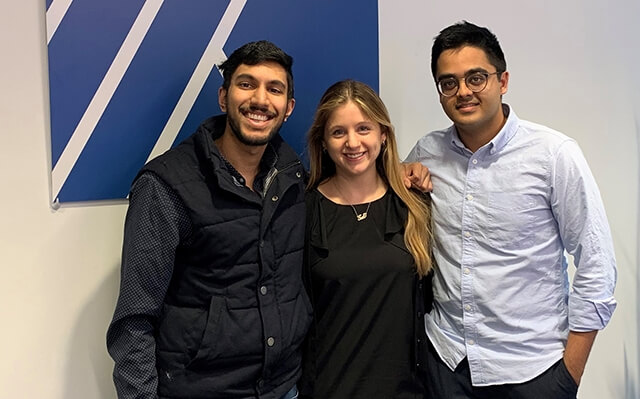As an ambitious Harvard freshman, Vinay Iyengar launched a tech startup with a friend that used natural language processing to turn email inboxes into to-do lists.
“It was a total failure,” he recalled, laughing. “We got caught up in that story where two kids start a company in their Harvard dorm room, drop out, and become billionaires. But in spite of that, I caught the entrepreneurship bug, and was soon spending all my free time thinking about startups and business ideas.”
That led Iyengar to the vast entrepreneurial resources available at the Harvard Innovation Labs, where he was soon spending much of his free time.
“I realized that I love coming up with ideas and thinking about what the future looks like,” said Iyengar, A.B. ’18, a computer science concentrator at the John A. Paulson School of Engineering and Applied Sciences. “While I couldn’t turn my vision to a reality the first time around, I am thrilled to partner with folks who are doing that and help them build the future of technology.”
Iyengar’s interest in tech entrepreneurship began during his childhood in Portland, Ore.
His parents emigrated from India to the Pacific Northwest, where his father worked as an engineer. Hearing about technology and innovation around the dinner table inspired Iyengar, who began sneaking into computer science classes at the local community college and taught himself to code.
In high school, he put those skills to use, working on a cryptography and security algorithms research project with a University of Washington professor.
At Harvard, now fully immersed in the world of tech, Iyengar interned as a Silicon Valley software engineer and then spent the following summer at Goldman Sachs, working on the trading floor.
“Working in big tech was too much of sitting in a cubicle and writing code,” he said. “And the Wall Street experience was too much about making money. From those experiences, I gathered that the startup world was where I belonged.”
Iyengar's first (failed) venture, Retask, was a tech startup that used natural language processing to turn email inboxes into to-do lists. (Photo provided by Vinay Iyengar)
Iyengar finally found the right fit working for Rose Park Advisors, a venture fund founded by Clayton Christensen, Kim B. Clark Professor of Business Administration at the Harvard Business School, that focuses on helping small, disruptive companies grow (Christensen passed away on Jan. 23, 2020). In venture capital, he could combine his love of entrepreneurship with his desire to help founders capitalize on the best opportunities.
After graduation, he joined Bessemer Venture Partners, one of the oldest venture capital firms in the U.S. and early backer of companies such as Skype, LinkedIn, Yelp, and Pinterest.
As venture capitalists, Iyengar and his colleagues search for the next big tech company. They consider broad trends in the tech industry and nationwide demographic changes as they weigh the pros and cons of pitches.
“It really is about finding a needle in a haystack. I spend the vast majority of my time talking to entrepreneurs and, unfortunately, most of the time I have to tell them, ‘no,’ but that is the nature of the business,” he said. “A lot of people are building startups, but only a few are going to be successful.”
At Bessemer, success is often due to the firm’s thesis-driven approach, Iyengar explained. For instance, they might choose a thesis like “the aging population of Baby Boomers will need better financial services because they haven’t saved enough for retirement,” then use that as a springboard to inform their search for startups.
But Iyengar said there is no formula for a successful startup, and that subjectivity makes the work especially challenging.
“It is incredibly rewarding to work with entrepreneurs,” he said. “They are probably the most inspirational people in the world. They have deep empathy for the problems they are trying to solve. They are very idealistic and the odds are stacked against them. Being able to help and support them—and even just hearing about their visions—is such an immense privilege.”
At Bessemer Venture Partners, Iyengar (left) and his colleagues search for the next big tech company. (Photo provided by Vinay Iyengar)
To Iyengar, venture capitalists carry a weighty responsibility, not only for the funds they allocate, but for the kind of tech world they help create.
He joined the firm at the height of the #MeToo movement and began exploring diversity in tech.
Iyengar studied records of VC-backed companies and soon saw how a decades-long lack of funding for women entrepreneurs and founders of color has contributed to a dearth of diversity at startups.
“VC firms have a ton of power and influence. We are writing these big checks to entrepreneurs, and also helping them build their companies and shape their visions,” he said. “If you want to make a change, it starts when that check is written. You have to be investing in diverse, mission-driven founding teams, and then you have to help them build diverse companies.”
So, this year, Iyengar helped launch the Bessemer Fellowship Program, which targets college students from underrepresented backgrounds in tech, and pairs them with Bessemer portfolio companies for summer internships.
The program, which kicks off this summer, will include about 20 fellows from universities across the country. It also provides career coaching, educational opportunities, and support for fellows as they launch careers.
“Working on this program is incredibly rewarding,” Iyengar said. “A lot of people think the venture capital industry is only focused on making money, but I’m trying to change the dialogue and show that it’s about much more. We are trying to back people who want to change the world, who are working to improve our communities and our country.”
Press Contact
Adam Zewe | 617-496-5878 | azewe@seas.harvard.edu


